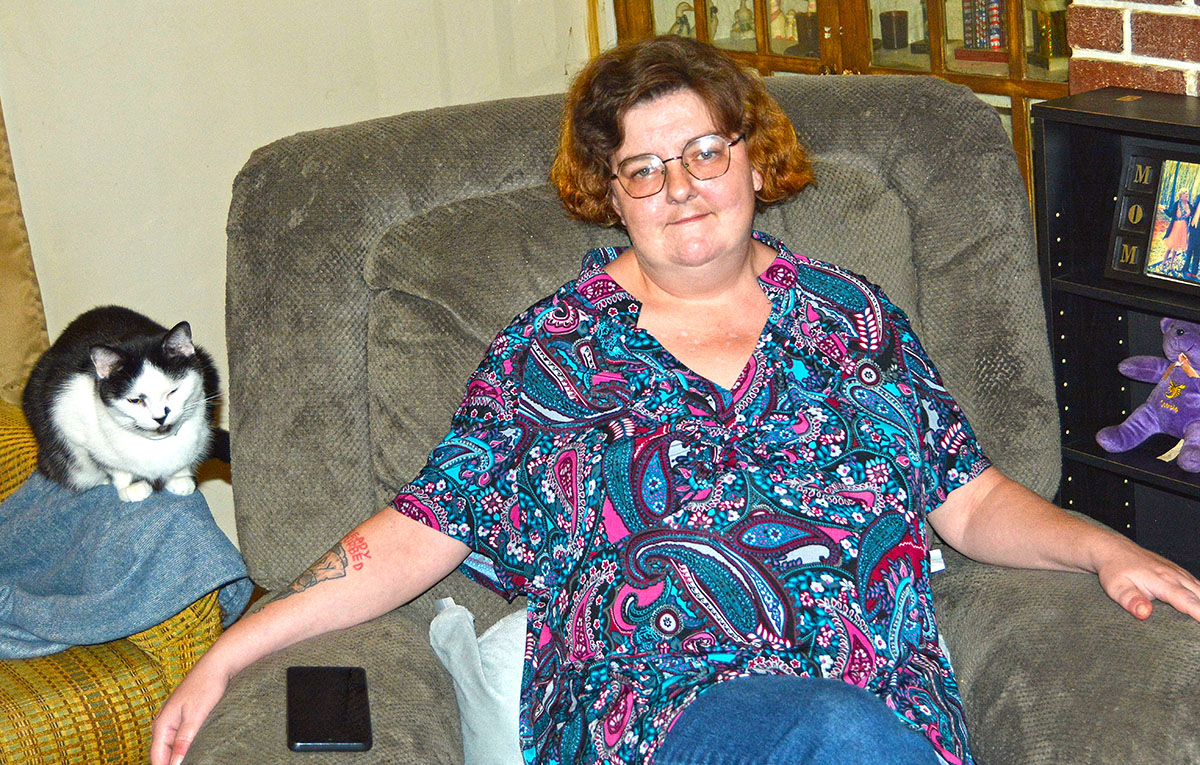(Advertisement)
Tube City Community Media Inc. is seeking freelance writers to help cover city council, news and feature stories in McKeesport, Duquesne, White Oak and the neighboring communities. High school and college students seeking work experience are encouraged to apply; we are willing to work with students who need credit toward class assignments. Please send cover letter, resume, two writing samples and the name of a reference (an employer, supervisor, teacher, etc. -- not a relative) to tubecitytiger@gmail.com.
Ads start at $1 per day, minimum seven days.
SNAP Shut-Down Worries Local Users
Recipients still in limbo following judges’ decisions, administration’s push-back
By Staff Reports
The Tube City Almanac
November 04, 2025
Posted in: State & Region
Written by Vickie Babyak and Jason Togyer

Crystal Reist relies on SNAP benefits to care for herself and her mother: “If it’s between paying a bill or purchasing food, we will choose having food on the table.” (Vickie Babyak photo for Tube City Almanac)
Although two federal judges have ordered the U.S. Government to pay supplemental nutrition benefits to about 42 million Americans, the funds remain frozen.
That has left nearly 2 million Pennsylvania residents — including 160,000 people in the Pittsburgh area — unsure how they’re going to pay their bills this month.
Crystal Reist is a 40-year-old McKeesport resident receiving disability benefits due to bipolar disorder, debilitating migraines and herniated discs in both her neck and back. She shares an apartment with her mother, who also receives disability benefits.
Without the Supplemental Nutrition Assistance Program, Reist said, she worries about making ends meet and hopes nothing major such as a large appliance breaks down, because they won't be able to cover costs for repairs. It will be out of the question to buy clothes or shoes, and we’ll need to cut back on everything, she said.
“If it’s between paying a bill or purchasing food, we will choose having food on the table,” Reist said.
The federal government shut down all non-essential operations Oct. 1 after the Republican-controlled U.S. Senate and U.S. House of Representatives failed to reach an agreement on a so-called “continuing resolution” to fund government operations.
U.S. Rep. Mike Johnson, the Louisiana Republican who serves as speaker of the house, has adjourned that chamber and told reporters he has no plans to call it back into session.
Although the federal government has been shut down under similar conditions before — including twice during President Trump’s first term — it has never before refused to pay Supplemental Nutrition Assistance Program, or SNAP, benefits, sometimes called “food stamps.”
On Friday, federal judges in Massachusetts and Rhode Island ordered the Trump administration to pay benefits from contingency funds. Monday, federal officials said they would release partial funding for the SNAP program, but then, on Tuesday, President Trump himself said on social media that his administration would not comply.
In a post on his Truth Social platform, Trump claimed SNAP benefits were given “to anyone for the asking” by “Crooked Joe Biden” and that the payments will not be made until “Democrats open up government.”
Advocates for nutrition programs said the president’s claims are not true.
Pittsburgh-based Just Harvest said most recipients of SNAP benefits are children or the elderly. About 80 percent of all SNAP benefit recipients are households with children, senior citizens, or a disabled person who cannot work, according to Just Harvest.
Reist lives with her mother, who is also partially disabled by pain she suffers from being hit by a car as a child. She often walks to the local Giant Eagle for groceries or prescriptions when she cannot get transportation.
Without knowing how long this situation will last, Reist is trying to conserve money so that she can afford $30 plus bus fare for a doctor’s appointment later this month. She’s also worried about feeding her three well-loved rescue cats.
Reist and her mom prepared for the shutdown by purchasing food in bulk while it was on sale and freezing portions for later use. She said her mom often cooks more than they need for one meal, especially stews or soups, and freezes the leftovers for another day.
Reist is reluctant to go to a food bank or pantry for help because, she said, there are families who need the help more.
“We will hold off on going to the food banks as long as we can because our main concern is that kids don’t go hungry,” she said.

Chelsey McDonald works full-time with children who have special needs. She tries to ignore comments on social media about people who use SNAP. (Vickie Babyak photo for Tube City Almanac)
Chelsey McDonald of White Oak works full-time with children who have special needs, but her typical day begins by waking up her own sons — ages 5 and 12 — and getting them ready for school before she heads to work. Her workday begins before 8 a.m.
McDonald’s family qualifies for SNAP benefits despite the fact that she is fully employed. “I’m worried about not being able to afford food for my kids and myself, but more importantly for my kids,” she said.
She said it’s hurtful when she reads rude comments directed at people who receive SNAP benefits, such as “get a job” or “stop being lazy,” although she’s not surprised.
McDonald said she tries to overlook negative comments on social media, though she occasionally responds if she’s had a bad day.
Her parents are able to help with child care and can sometimes provide financial assistance, but she said she doesn’t want to constantly ask her family for money.
McDonald said there are some people who take advantage of programs such as SNAP, but that most of the people she knows are underpaid working people such as herself, people on disability, or the elderly.
“I don’t have anyone who can watch the kids all the time, so a second job isn’t an option for me because of childcare costs,” McDonald said.
Through a spokesperson, U.S. Rep. Summer Lee said stories such as those of McDonald and Reist are typical of SNAP users. Lee said that even before the current government shut down, the Trump administration had already cut millions of dollars from food programs for Americans.
The ProPublica news service reported that the so-called “One Big Beautiful Bill Act,” passed by Congress in July, eliminated $500 million from a program that provided U.S.-produced meat, dairy, eggs and produce to food banks — about 94 million pounds of food in all.
“In the wealthiest country in the world, no one should face hunger,” Lee said in a statement to Tube City Almanac. “We have to keep pressing the Trump administration to use the contingency reserve and for Speaker Johnson to bring the House back to negotiate a bill to fund SNAP, protect healthcare, and reopen the government.”
Vickie Babyak (vbabyak@yahoo.com) is a freelance writer and photographer from Dravosburg. Jason Togyer (jtogyer@gmail.com) is editor of Tube City Almanac and executive director of Tube City Community Media Inc.
Originally published November 04, 2025.
In other news:
"Two Polling Places Mo…" || "Consultants Tour City…"
 TM
TM